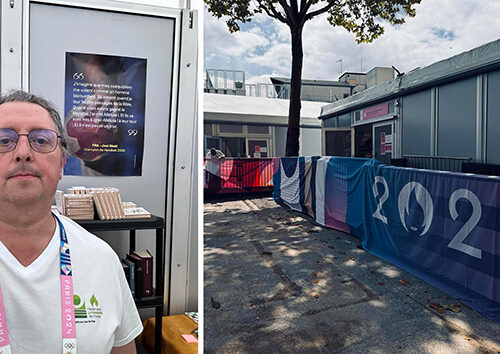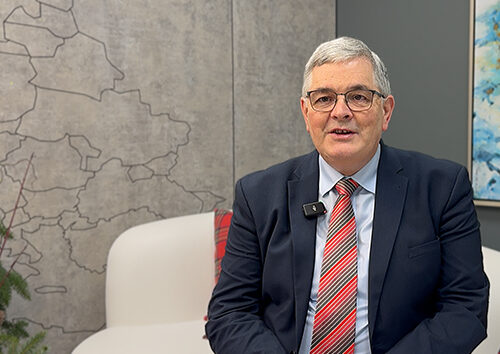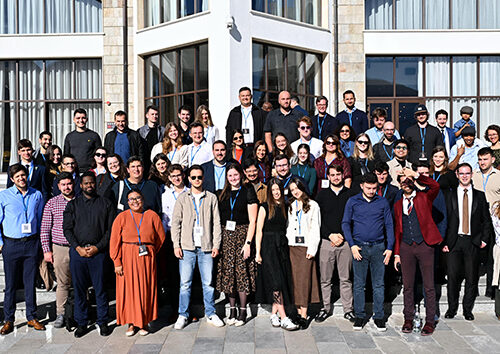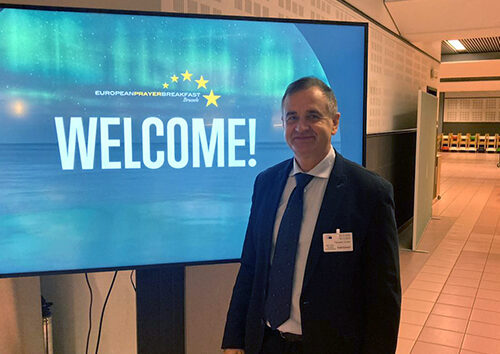20 August 2024 | Paris, France [Daniel Kluska]
The recent Paris 2024 Olympic and Paralympic Games captivated viewers around the world, creating memories that will last a lifetime. While most people had a favourite athlete or team they cheered for throughout the Games, a lesser-known yet equally important team was also present—the team of chaplains established by The Protestant Federation of France (FPF) to support athletes and staff members. Among them was a representative from the Seventh-day Adventist Church.
In an interview with Daniel Kluska, Communication and Media Director for the Polish Union Conference, Pascal Rodet, pastor and Ministerial Secretary at the Franco-Belgian Union Conference, shares his thoughts on this unique experience.
[DK] Thanks for agreeing to the interview. Could you please start by telling us more about yourself?
[PR] My pleasure. I have been a pastor of the Adventist Church for many years now. It’s hard to believe, but I am already 60 years old. I am married and have two sons, aged 27 and 30. I began my ministry in the early 1990s, leading several churches in the North of the French-Belgian Union.
In 2001, I was asked to lead the Youth Ministry department. Then, in 2008, I was appointed director of the Education Centre at the French-Belgian Union, overseeing the departments of youth, children, family, and education—a position I held until 2023. Since then, I have continued to serve the Franco-Belgian Union as secretary of the Pastor’s Association, while also implementing missionary activities that require extra support.
[DK] How did you get involved in the Olympic Games? Was there an application process?
[PR] Due to the structure of the organisation, which only communicates with the main religious groups, the French-Belgian Union has been a member of the Protestant “family”—Protestant Federation of France—for about 20 years. As such, we participate in various interfaith working groups. This partnership provides a good opportunity to share our biblical understanding and vision of the Gospel and to be an active partner with others in society.
When France’s bid to host the 2024 Olympics was accepted, it involved a commitment to organise a safe space where athletes and staff could find peace and receive spiritual support from trained chaplains. As a result, the Olympic Committee turned to the main religious denominations for this purpose. From the perspective of the FPF, the aim was to ensure that all its members, including the Seventh-day Adventist Church, had the opportunity to be represented.
In the next step, each candidate had to fill in a form and meet several specific requirements to be selected. Finally, those who were selected had to undergo special training for 10 days. Various aspects of the importance of faith in the context of the stress of competition were discussed. The importance of spiritual life in balancing the athletes’ experiences and the role of the chaplain was consistently emphasised. It was during this process that I discovered that more and more athletes are recognising spirituality as an integral part of their whole being.
[DK] How would you describe your experience as an Olympic Chaplain?
[PR] It has been a very positive experience. I expected to welcome more people to the Prayer Centre. However, for some reason, it has sometimes been very difficult for athletes to find us.
This experience showed that while sports can bring people of different backgrounds together, faith can be an even greater source of bonding and international relationships. Athletes and staff from different countries were eager to come together to worship God and pray, creating a sense of unity and common purpose. These were wonderful experiences!
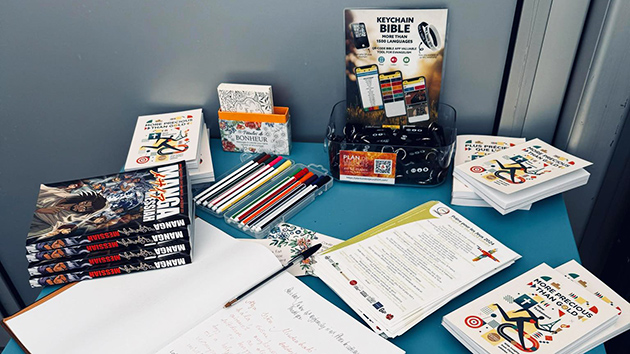
The centre was also a place where we could present and exchange our different religious practices, which helped break down many barriers. There was a strong sense of brotherhood and respect in our village.
[DK] Does any special experience come to mind?
[PR] One experience touched me deeply. A female athlete from an African country came to us after she felt the referee had treated her unfairly. She wanted to express her anger and frustration and seek God’s help through prayer. We suggested that, in addition to asking God to influence the outcome, it would be beneficial to ask Him to calm her heart so that she could find peace regardless of the outcome.
The next day, she came back to tell us that although she had not won her case, through prayer God had shown her that the most important thing was to base her life on her relationship with Him, not on the outcome and her achievements. She wanted to pray with us to thank God. This moment also reminded her that she plays sports because God has allowed her to do so and that she can give Him glory through her sporting achievements.
[DK] That’s a remarkable experience. Were there any Adventist athletes at the Olympics?
[PR] Yes! There are certainly a few Adventist athletes, although I don’t know the exact number. On one occasion, an Adventist athlete visited the centre; unfortunately, I was not on duty at the time and could not meet him.
Among the chaplains at the Olympics was a former French athlete who is an Adventist and became our chaplain at the Games. He had a very successful career during which he won several medals in international and Olympic competitions. He lived his faith with courage and witnessed the love of Jesus among his teammates. His personal and practical experience is invaluable to us. On more than one occasion, he shared stories of teammates asking him to pray before important matches.
[DK] How would you respond to Adventists who are critical of competitive sports, often arguing that they provoke negative emotions?
[PR] Sport at the highest level is a source of intense emotion. It can be like an emotional rollercoaster. This presents a challenge for many athletes who prepare for two to four years, only to arrive at the Olympic Games and finish with a poor or unsuccessful result. This can be extremely frustrating, as it can feel like all their hard work has been in vain.
Then some win a gold medal and become national heroes, only to finish second, third, or even lower in the rankings four years later. For gold medal winners, there is a term used to describe any future competitions: “silver medal syndrome”. In the end, it is important to get a grip on your emotions and remind yourself that rankings can change.
However, the emotional aspect is not the most important. First and foremost, as Adventists, we acknowledge that engaging in some kind of sport or physical activity is beneficial to a person. But whether someone should compete at the Olympic Games is another matter.
There are many valuable lessons to be learned from the relationship between competitive sports and life education. It requires tremendous discipline. Athletes must train consistently, always strive to improve, and endure considerable physical and mental strain. They must develop a balanced lifestyle in which diet, hydration, and rest are important factors. This is an example that could benefit both young and old.
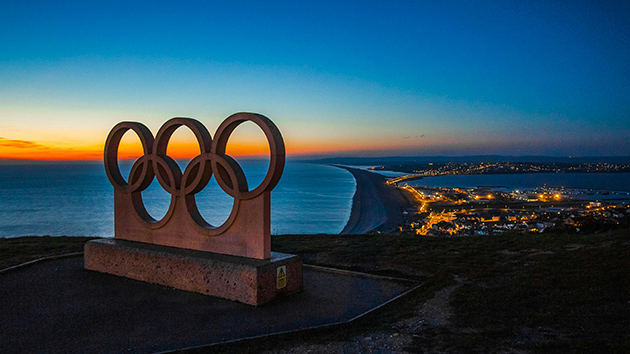
[DK] These are all very valuable lessons.
[PR] Yes. In addition, I would like to emphasise the importance of learning self-control. For an athlete to go far, they must understand themselves, know others, and respect their opponents, both in victory and defeat. Self-awareness also includes recognising one’s limitations, capacity for endurance, and willpower.
The Apostle Paul shares these concepts very well in his letters, speaking of athletes who impose all kinds of discipline on themselves to win a prize. He encourages us to do the same. The best athletes need to learn a discipline that strengthens them both physically and mentally.
From my perspective, sports can serve to glorify God. I have met top athletes who glorify God. They believe and express that without Jesus in their lives, they could not have achieved the level of success they have. The result of this attitude is responsible men and women who are equipped for life to face all kinds of challenges, just as they have been trained to do in sports.
[DK] Thank you for the interview and your service at the Paris 2024 Olympic and Paralympic Games!
